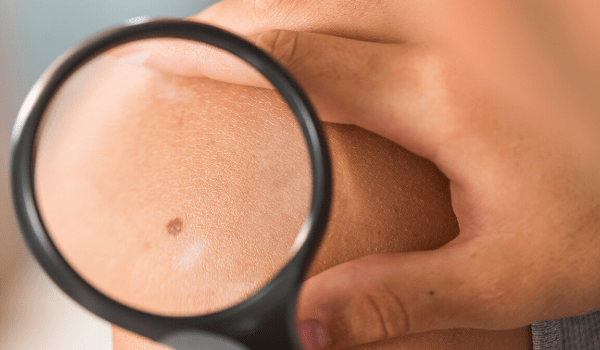There are some instances when your dermatology concerns may require surgery, and like other medical specialties, a dermatologic surgeon has specific expertise to perform these surgeries.
A dermatologic surgeon is trained to perform both surgical and non-surgical procedures. You may be wondering what kind of skin conditions can lead to needing surgery. There are three common concerns that may need surgical dermatology care: skin cancer, moles, and other skin lesions.
-
Skin Cancer
Skin cancer cannot be left untreated. It must be removed via dermatologic surgery. A common surgery to remove skin cancer is Mohs Surgery. In Mohs surgery, the surgeon removes cancerous skin by thin layers. As each layer is removed, they are analyzed for cancer. Once a layer with no sign of cancer is removed, the surgery is ended. This allows you to keep as much healthy tissue as possible in the affected area.
There are different types of surgery to remove skin cancer, and your dermatologic surgeon will help you choose which type of surgery is best suited for you.
-
Moles
Many types of moles can be removed by a dermatologic surgeon for either cosmetic or health reasons. A mole is typically removed in one appointment, but removal of your mole may take two appointments depending on the size of it. There are two common procedures used for mole removal: shave excision and surgical excision.
While both types of surgical procedures for mole removal are excisions, there are some differences. During a shave excision, the surgeon uses a thin, razor-like tool to slice away the mole. Electrosurgical feathering may be used to help diminish the appearance of the excisions by blurring the edges of them. Stitches are not typically needed for a shave excision.
A surgical excision, while similar to a shave excision, is a more traditional surgical procedure. You are placed under general anesthesia during a surgical excision. While you are under general anesthesia, the surgeon will remove the mole down to the subcutaneous fat layer of skin. This is a deeper cut than the shave excision, and stitches are needed to close the wound. Once a mole has been removed via a shave or surgical excision, it is analyzed for cancer.
-
Other Skin Lesions
A dermatologic surgeon can also perform other dermatologic surgeries for skin lesions that are not diagnosed as skin cancer or a mole. A skin lesion is an abnormal growth or area of skin that is different from the skin surrounding the area. There are two types of skin lesions, primary and secondary. Primary skin lesions are present at birth or acquired over someone’s lifetime. A secondary lesion develops when a primary skin lesion has been irritated.
Skin lesions can be caused by several things such as: sebaceous cysts, boils, nodules, and keloids. Other medical concerns can cause lesions as well. If you have an abnormal area of skin, it is best to see a dermatologist to diagnose the concern. Your dermatologist will recommend a surgeon on their team if the skin lesions need to be removed.
Finding out you need a surgical dermatology procedure can be overwhelming, but choosing a dermatologic surgeon doesn’t have to be. Our surgeons at Vujevich Dermatology are highly trained, board-certified, and have an outstanding reputation in the Pittsburgh area and the dermatology community. Our surgeons perform procedures in our state of the art facilities, the Mohs Surgery Center and the Ambulatory Surgery Center.
If you have a skin lesion that may require surgical dermatology, contact our offices today to schedule a consultation.
Vujevich Dermatology Associates offers medical, surgical, and cosmetic dermatology from some of the most highly trained physicians and clinicians in the greater Pittsburgh area. You can reach our team at 412-429-2570 or visit our contact page to see all of our locations. You can also follow us on Facebook to see what’s new in the world of dermatology.

